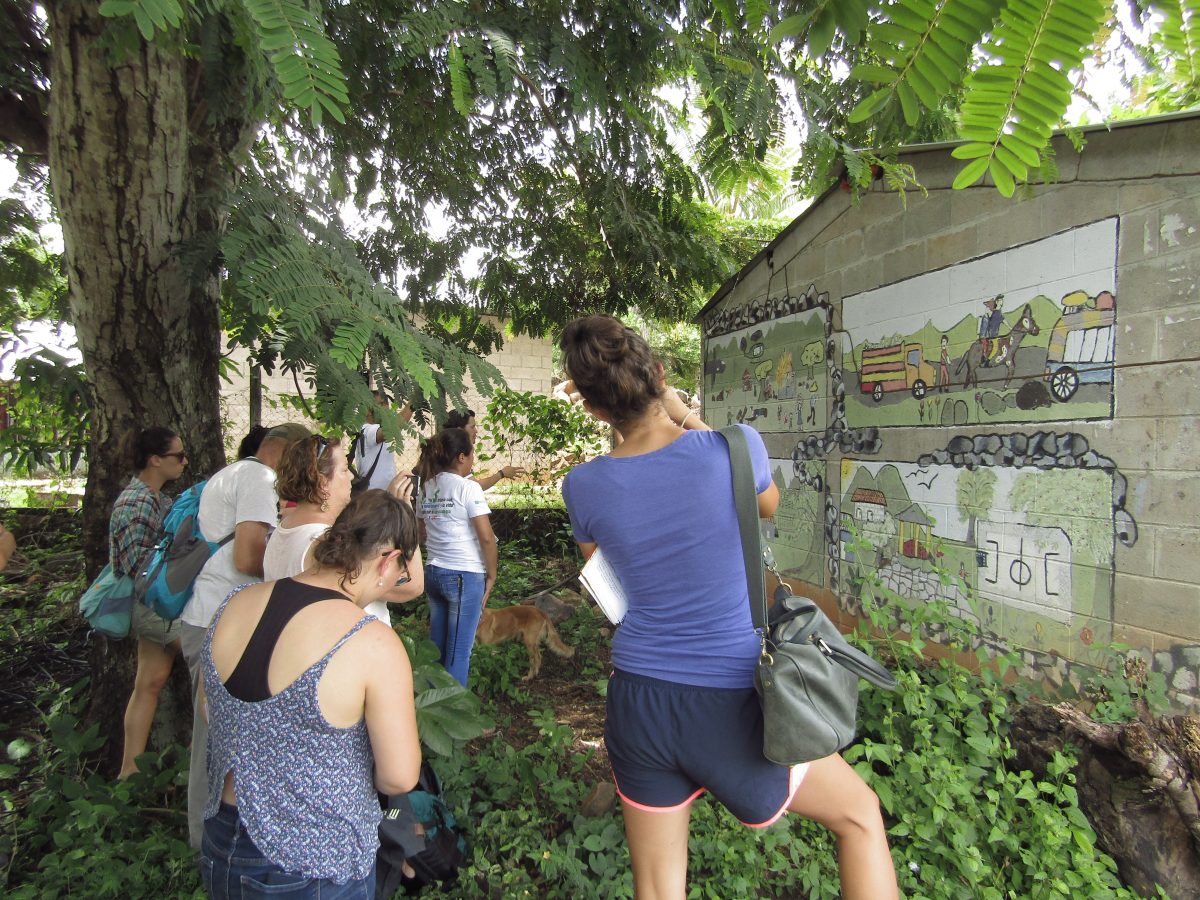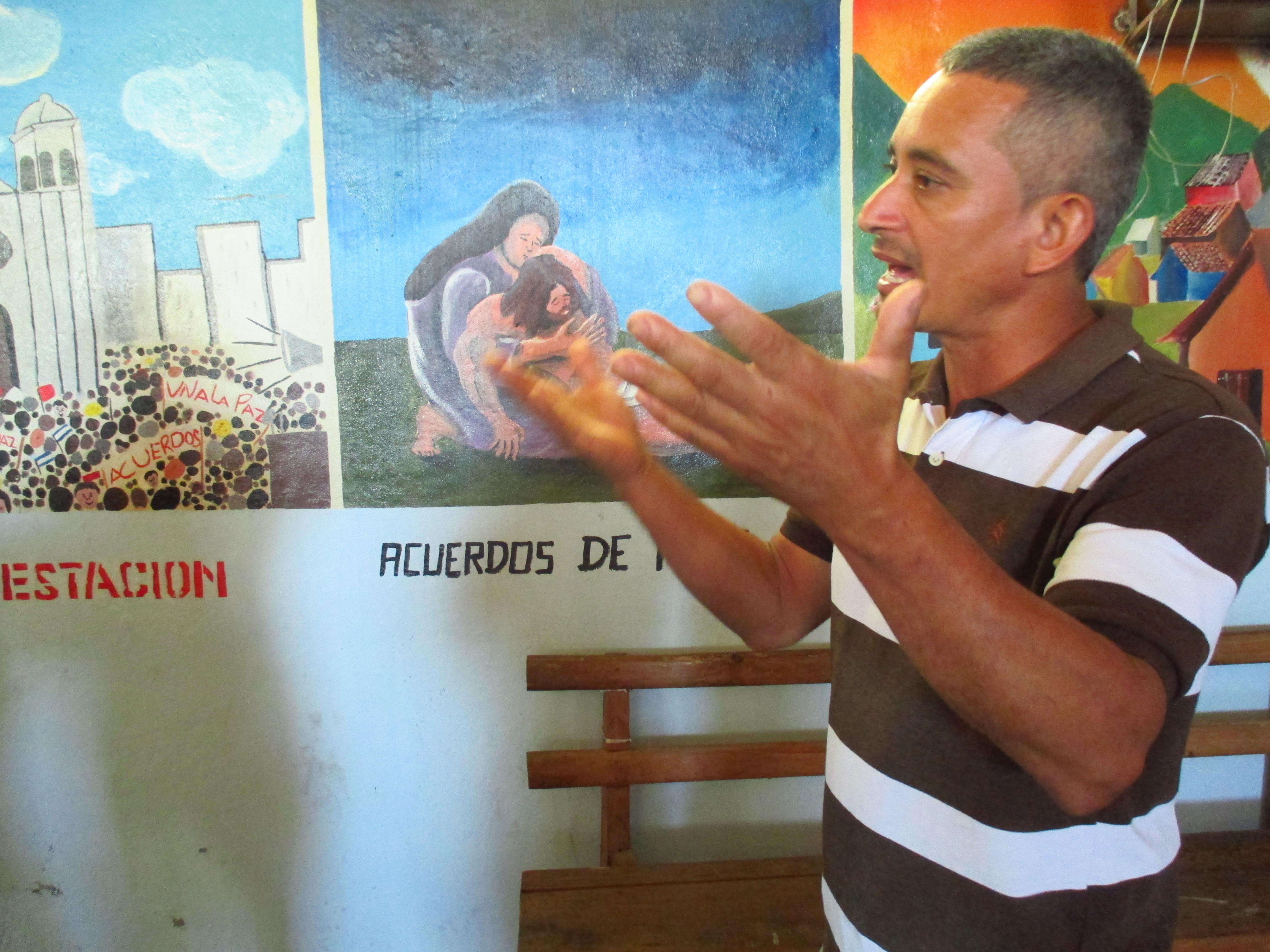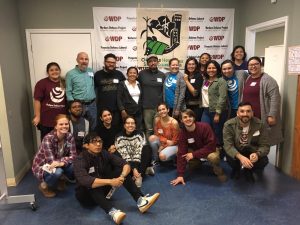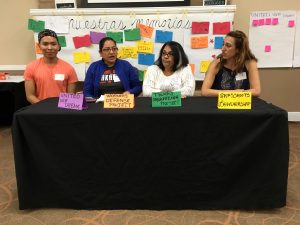Delegations, Sister Cities
Reflection on Popular Education, Compassion, and Learning // Reflexión sobre la educación popular, compasión y aprendizaje
(EN ESPAÑOL ABAJO)
Lily Herakova wrote a version of this reflection in an email to the popular education working group. We found her ideas insightful. Her thought process applies popular education ideology, what she learned in El Salvador, as well as her current realities and experiences to the challenges we are currently facing. We hope you find this as helpful as we did.
Lily is a mother, educator, immigrant, baker, writer, and a hopeful cultivator of community. She participated in the Popular Education School in El Salvador in the summer of 2019 and continues to learn with that experience and with the people involved in it. She is an Assistant Professor and Graduate Teaching Coordinator in the Department of Communication and Journalism at the University of Maine, Orono. Her work focuses on communication’s potential to bring about equitable, just, and inclusive worlds/communities, especially in educational and health-related contexts.
Where are your lives right now?
I’ve been thinking about putting some things down on paper when I have more time, but it seems that time is both elusive and elastic right now. What is “the right time” to concentrate on anything other than schoolwork, kids, and worries, glimmers of hope? So, right or not, I thought I’d share some ideas with you.
In the wake of educational institutions responding to COVID-19, many of my teacher colleagues continue to send messages outlining various dire situations – of students without jobs, having to take care of siblings or parents, of migrant workers here or in India who are stuck in a lock down without work, food, or housing. I am sure we all can give multiple other examples. All of these are real, visceral challenges. I took a “distanced” walk with a student yesterday who was/is on the precipice of a mental health crisis. What could I do but walk with them? My partner, who is a healthcare provider with background in youth psychiatry, asked me to make sure I was walking with the student “not on the trails” but on campus and always within eyesight of the blue lights (emergency reporting system we have at the University of Maine). That’s something I hadn’t thought about at all. My partner’s worries are real, too. And this situation is maybe one small, self-centered example of the mess of relationships and responsibilities we are always navigating, but perhaps are made more visible by current experiences related to COVID-19 fears, measures, responses.
The thing that’s striking to me about messages I receive from colleagues is that they usually end up saying something like, “We need to be compassionate right now and understand there are more urgent things in the life of students than learning, that learning might be impossible in these circumstances.” Such calls are also part of advice and “viral” responses that are circulated among U.S. faculty in publications like the Chronicle of Higher Education. I wonder, what is the “learning” that is assumed in such statements? It’s not the call for compassion that “bothers” me in this, obviously… What confounds me, infuriates me is this implied re-performance of Maslow’s hierarchy that somehow juxtaposes compassion to learning. Why is compassion the opposite of learning?
This is where I think we can all learn so much from and with popular education. The lesson is so simple: learning is compassion and it is survival; Maslow’s typology of needs can help us categorize, but it is not a hierarchy. Because as we, people, are experiencing and expressing the uncertainty of the present, each in a different way – the universal singular (Denzin; Spry) – the compassionate role of learning should be that of analysis of the forces that make this possible – and I mean analysis in all its potent forms. Hunger is analysis. Fear is analysis. Shrugging it off is analysis. Walking with a distressed student on campus is analysis, so is my partner’s advice.
I think about the people we met in El Salvador who maintained that the war was necessary and lived by Freire’s principles of “reading the word and the world.” These were not opposites, they necessitated one another and necessitated response to a dire situation of colonial “subservience.” Don Manuel, a man we met in Cinquera, didn’t have food to eat, nor the right to keep any of the produce he was growing on a land he had no right to own, but he did not say, “Well, first, I’ll make sure to have food and then I’ll learn about the ideologies and forces that make food impossible for me to attain.”
So, what are our roles as critical educators in the now? I don’t think it’s to say, “Hey, let me give a $100 to this student support fund,” and tell students, “I know life is tough right now, so make sure you’re okay first and the class can take a back seat” (how are they supposed to make sure they’re okay?! I’m so confused by this language of “compassion” that seems to end up in disengagement…). It’s not to pacify ourselves as charitably compassionate teachers, but to change our practices.
I think all of us, no matter how critical, have some tendencies, as we have learned in educational systems that are built on the banking model, the main contribution of which is the reproduction of inequitable social systems (Freire). For example, I catch myself in a “banking” yearning when I think and sometimes say, “Urgh! Can’t you just read the e-mail I sent, what is so difficult to understand?!” Especially in this time of remote learning, I want transmission to work much better, much more linearly than I know it does; there is a part of me that wishes students were indeed “receptacles” waiting to be filled and that I can fill them with comfort and wisdom. That yearning becomes for me a point of critical analysis. What is it in the content or the process of the classes we facilitate that can be spaces of analysis and action? Any class in any academic discipline can examine how knowledge in that discipline is produced, who creates it, and how these dynamics produce the inequity that makes the now dire. What’s the risk in that? “Producing” disillusioned and angry “masses”? Pushing some to even greater apathy? Or worse yet – inciting xenophobic nationalist patriarchal protective reactions?
I don’t know… I’m still thinking through this, and this has been one of my ongoing challenges – what is critical compassionate learning in the now and what are its risks. I can’t justify war the way Don Manuel did (“it was horrible, but necessary”), and I can’t justify the downward spiral of pessimistic disengagement that I have lived as a child of communism in a post-communist society that has reduced most of the people I love to really just surviving.
If you got to here, thank you! Looking forward to our conversations…
Lily
PS: Some things have changed for me since I first wrote this in an e-mail (3/31/20), many things have changed for the students and educators I am walking this journey with. The weight of the everyday has become heavier, but we have not given up on feeling it fully, not as inevitable, but as constructed. In the classes I teach, we have moved heavily into reflection through journaling and performance by mixing personal experience, cultural narratives, and expert discourses we read in media and academic articles. This does nothing, it seems, to lift any of the weight, just makes it heavier… Am I failing at compassion? Do we have to get to a point where the weight is unbearable and also supremely clear, so that we rise and lift it… is that the purpose of popular education? I think also about this interview with writer Carolyn Forché where she discusses some differences between El Salvador and the U.S. and the role of poetry and writing in social change. I think of the poetry we saw on walls in El Salvador… What do you think? What do you know from your position of relationship to the Sister Cities now and historically?
EN ESPAÑOL
Lily Herakova escribió una versión de esta reflexión en un correo electrónico al grupo de trabajo de educación popular. Pensamos que eran muy profundas. Sus ideas aplican la ideología de la educación popular, lo que aprendió en El Salvador, así como sus realidades y experiencias ante los desafíos que enfrentamos actualmente. Esperamos que encuentre esto tan útil como nosotros.
Lily es madre, educadora, inmigrante, panadera, escritora y, llena de esperanza, sigue construyendo una comunidad. Participó en la Escuela de Educación Popular en El Salvador en agosto de 2019 y continúa aprendiendo de esa experiencia y de las personas involucradas en ella. Es profesora asistente y coordinadora de enseñanza de posgrado en el Departamento de Comunicación y Periodismo de la Universidad de Maine, Orono. Su trabajo se centra en el potencial de la comunicación para lograr mundos / comunidades equitativos, justos e inclusivos, especialmente en contextos educativos y relacionados con la salud.
¿Dónde están sus vidas ahora?
He estado pensando en escribir algunas cosas cuando tenga más tiempo, pero parece que actualmente el tiempo es esquivo y elástico. ¿Cuál es “el momento adecuado” para concentrarse en otra cosa que no sea el trabajo escolar, los niños y las preocupaciones, destellos de esperanza? Así, bien o mal, pensé en compartir algunas ideas con ustedes.
Mientras las instituciones educativas buscan cómo responder al COVID-19, muchos de mis colegas docentes continúan enviando mensajes que describen varias situaciones terribles: de estudiantes sin trabajo, que tienen que cuidar a hermanos o padres, de trabajadores migrantes aquí o en India que están encerrados sin trabajo, comida o vivienda. Estoy seguro de que todos podemos dar muchos otros ejemplos. Todos estos son desafíos reales, viscerales. Ayer di una caminata “distanciada” con un estudiante que estaba / está al borde de una crisis de salud mental. ¿Qué podría hacer sino caminar con ellos? Mi compañero, que brinda atención médica con experiencia en psiquiatría juvenil, me pidió que me asegurara de caminar con el estudiante “no en los senderos” sino en el campus y siempre a la vista de las luces azules (sistema de emergencia que tenemos en la Universidad de Maine). Eso es algo en lo que no había pensado en absoluto. Las preocupaciones de mi compañero también son reales. Esta situación es quizás un pequeño ejemplo egocéntrico del desorden de relaciones y responsabilidades en el que siempre estamos navegando, pero quizá se hacen más visibles con las experiencias actuales relacionadas con los miedos, medidas y respuestas al COVID-19.
Lo que me llama la atención sobre los mensajes que recibo de mis colegas es que generalmente terminan diciendo algo como: “Necesitamos ser compasivos en este momento y comprender que hay cosas más urgentes en la vida de los estudiantes que aprender, que aprender podría ser imposible en estas circunstancias”. Estas frases también son parte de consejos y respuestas “virales” que circulan entre los profesores de los Estados Unidos en publicaciones como Chronicle of Higher Education (Crónica de Educación Superior). Me pregunto, ¿cuál es el “aprendizaje” del que se habla en estas expresiones? No es el llamado a la compasión lo que me “molesta” en esto, obviamente … Lo que me confunde, me enfurece es esta repetición implícita de la jerarquía de Maslow que de alguna manera yuxtapone la compasión al aprendizaje. ¿Por qué la compasión es lo opuesto al aprendizaje?
Aquí es donde creo que todos podemos aprender mucho de y con la educación popular. La lección es muy simple: aprender es compasión y es supervivencia. La tipología de necesidades de Maslow puede ayudarnos a clasificar, pero no es una jerarquía. Porque a medida que nosotras, las personas, experimentamos y expresamos la incertidumbre del presente, cada una de una manera diferente, el singular universal (Denzin; Spry), el papel compasivo del aprendizaje debe ser el análisis de las fuerzas que lo hacen posible. Y me refiero al análisis en todas sus formas potentes. El hambre es análisis. El miedo es análisis. Ignorarlo es análisis. Caminar con un estudiante angustiado en el campus es un análisis, así como el consejo de mi compañero.
Pienso en la gente que conocimos en El Salvador que dijo que la guerra fue necesaria y vivió según los principios de Freire de “leer la palabra y el mundo”. Estos no eran opuestos, se necesitaban mutuamente y requerían respuesta a una situación grave de “servilismo” colonial. Don Manuel, un hombre que conocimos en Cinquera, no tenía comida para comer, ni el derecho de conservar ninguno de los productos que estaba cultivando en una tierra que no tenía derecho a poseer, pero no dijo: “Bueno, primero, me aseguraré de tener comida y luego aprenderé sobre las ideologías y las fuerzas que me hacen imposible tener comida”.
Entonces, ¿cuáles son nuestros roles como educadores críticos en el ahora? No creo que sea para decir: “Voy a dar $100 a este fondo de apoyo estudiantil” y decirles a los estudiantes: “Sé que la vida es difícil en este momento, así que asegúrate de que estás bien primero y la clase puede esperar” (¡¿cómo se supone que deben asegurarse de que están bien?! Estoy tan confundida por este lenguaje de” compasión “que parece terminar en desconexión …). No es para sentirnos en paz como maestros caritativamente compasivos, sino para cambiar nuestras prácticas.
Creo que todos nosotros, sin importar cuán críticos, tenemos algunas tendencias “bancarias”, pues hemos aprendido en sistemas educativos que se basan en un modelo bancario, cuya principal contribución es la reproducción de sistemas sociales inequitativos (Freire). Por ejemplo, me encuentro en un anhelo “bancario” cuando pienso y a veces digo “¡Urgh! ¡¿No puedes leer el correo electrónico que envié, qué es tan difícil de entender?!” Especialmente en este momento de aprendizaje a distancia, quiero que la transmisión sea mucho mejor, mucho más linealmente de lo que sé que lo hace. Hay una parte de mí que desearía que los estudiantes fueran “recipientes” esperando ser llenados y poder llenarlos yo con comodidad y sabiduría … Ese anhelo se convierte para mí en un punto de análisis crítico … ¿Qué del contenido o el proceso de las clases que facilitamos puede convertirse en espacios de análisis y acción? Cualquier clase en cualquier disciplina académica puede examinar cómo se produce el conocimiento de esa disciplina, quién lo crea y cómo estas dinámicas producen la inequidad que hace tan grave el ahora. ¿Cuál es el riesgo en eso? ¿“Producir masas” desilusionadas y enojadas? ¿Empujar a algunos a una apatía aún mayor? O peor aún, ¿incitar reacciones proteccionistas patriarcales nacionalistas xenófobas?
No lo sé … Todavía estoy pensando en esto, y este ha sido uno de mis desafíos actuales: qué es el aprendizaje compasivo crítico en el presente y cuáles son sus riesgos. No puedo justificar la guerra como lo hizo don Manuel (“fue horrible, pero necesario”), y no puedo justificar la espiral descendente de desconexión pesimista que he vivido como hija del comunismo en una sociedad poscomunista que ha llevado a que la mayoría de personas que amo solo sobreviva.
Si llegaron hasta aquí, ¡gracias! Me gustaría que conversáramos después
Lily
PD: Algunas cosas han cambiado para mí desde que escribí esto por primera vez en un correo electrónico (31/03/20), muchas cosas han cambiado para los estudiantes y educadores con los que estoy caminando este viaje. El peso de lo cotidiano se ha vuelto más pesado, pero no hemos renunciado a sentirlo en su totalidad, no como inevitable, sino como construido. En las clases que enseño, nos hemos movido en gran medida a la reflexión a través de llevar un diario y mezclar las experiencias personales, narraciones culturales y los discursos de expertos que leemos en los medios y artículos académicos. Parece que esto no lograr quitar algo de su peso, sino que lo hace más pesado … ¿Me falta compasión? ¿Tenemos que llegar a un punto en el que el peso sea insoportable y también extremadamente claro para que nos levantemos y nos lo quitemos de encima … ese es el propósito de la educación popular? Pienso también en una entrevista con la escritora Carolyn Forché, donde analiza algunas diferencias entre El Salvador y los Estados Unidos y el papel de la poesía y la escritura en el cambio social. Pienso en la poesía que vimos en las paredes de El Salvador … ¿Qué les parece? ¿Qué saben desde su posición de relación con las Ciudades Hermanas ahora e históricamente?




